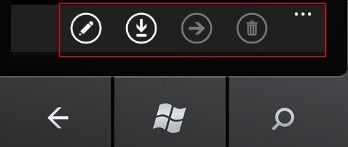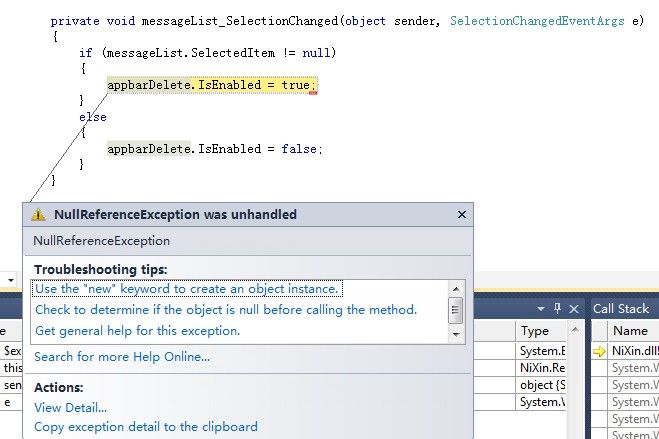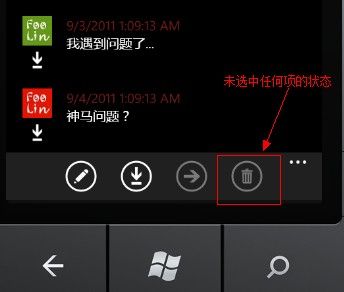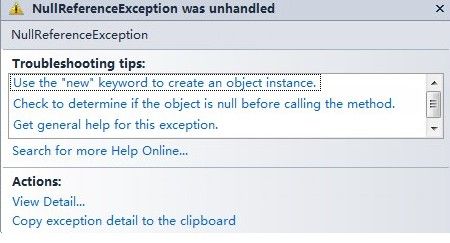Windows Phone 7常用的开发技巧&学习总结
现在WP7的中文学习资料还是非常的少,自己摸索Windows Phone 7有一阵子,现在与大家分享一些自己常用技巧和个人的学习总结,同时也作为自己学习资料,用到时方便查阅,由于个人学习能力和知识有限,如果有错误或者不好之处,欢迎大家拍砖纠正,同时欢迎大家共同交流。
1. ApplicationBar在其它事件中调用的方法
ApplicationBar控件时windows phone 7上的一个菜单,一个ApplicationBar最多可包含四个按钮。如果还有额外的选项可以通过菜单项来添加,这些菜单项默认是不显示的。只有在点击菜单栏右侧的省略号(或省略号下方的区域)时才会显示出来。它传统的Windows程序的菜单的作用类似。

ApplicationBar相信在WP7开发的时候经常会用到,但在页面的其它控件的事件中,如果直接使用他x:Name进行调用,会出现问题....
假如前台代码有个ListBox里的项,我想实现点击某一项时,利用ApplicationBar有个删除按钮(appbarDelete)的删除事件进行删除,因此在未选择任何项时,默认是禁用的(IsEnabled="False"),但点击ListBox某一项激活了之后,该按钮就启用(IsEnabled="True")。
ApplicationBar代码如下:
<phone:PhoneApplicationPage.ApplicationBar>
<shell:ApplicationBar IsVisible="True">
<shell:ApplicationBarIconButton x:Name="appbarDelete" IsEnabled="False" IconUri="/Assets/AppBar/delete.png" Text="删除" Click="appbarDelete_Click"/>
</shell:ApplicationBar>
</phone:PhoneApplicationPage.ApplicationBar>
ListBox前台接口如下:
<ListBox Name="messageList" SelectionChanged="messageList_SelectionChanged">
<ListBox.ItemTemplate>
<DataTemplate>
<!-- 这里省略 -->
</DataTemplate>
</ListBox.ItemTemplate>
</ListBox>
ListBox的选中事件代码如下:
private void messageList_SelectionChanged(object sender, SelectionChangedEventArgs e)
{
if (messageList.SelectedItem != null)
{
appbarDelete.IsEnabled = true; //选中某项时激活ApplicationBar的删除按钮
}
else
{
appbarDelete.IsEnabled = false; //未选中时禁用ApplicationBar的删除按钮
}
}
点击时会出现如下异常NullReferenceException:

这是因为ApplicationBar(ApplicationBarIconButton和ApplicationBarMenuItem)相关的类定义在Microsoft.Phone.Shell命名空间。与UIElement和FrameworkElement等常规Silverlight编程的类层次是完全分开的,严格说来ApplicationBar不是你的页面的可视化的一部分。
因此解决办法如下:
在Xaml构造函数初始化时,加入以下代码即可解决:
public DemoPage()
{
InitializeComponent();
// Re-assign names already in the XAML file
//解决按钮无法调用问题
appbarDelete = this.ApplicationBar.Buttons[3] as ApplicationBarIconButton;
}
注意,一般ApplicationBar有四个按钮,由于这个示例,只有一个按钮。加入上面这句代码之后,就可以解决问题,当我解决之后,点击列表某一项,就激活了删除按钮,我点击删除,就可以删除当前这项信息,如下图:

选中之后状态:

2.IsolatedStorage本地存储的封装类
IsolateStorage是本地存储的实现,具体介绍大家可以查阅相关资料,本次直接从微软Demo封装代码中抽取出来,具体代码如下:
 View Code
View Code
// ----------------------------------------------------------------------------------
// Microsoft Developer & Platform Evangelism
//
// Copyright (c) Microsoft Corporation. All rights reserved.
//
// THIS CODE AND INFORMATION ARE PROVIDED "AS IS" WITHOUT WARRANTY OF ANY KIND,
// EITHER EXPRESSED OR IMPLIED, INCLUDING BUT NOT LIMITED TO THE IMPLIED WARRANTIES
// OF MERCHANTABILITY AND/OR FITNESS FOR A PARTICULAR PURPOSE.
// ----------------------------------------------------------------------------------
// The example companies, organizations, products, domain names,
// e-mail addresses, logos, people, places, and events depicted
// herein are fictitious. No association with any real company,
// organization, product, domain name, email address, logo, person,
// places, or events is intended or should be inferred.
// ----------------------------------------------------------------------------------
using System.IO;
using System.IO.IsolatedStorage;
using System.Runtime.Serialization.Json;
using System.Text;
namespace Foolin.Helper
{
public static class IsolatedStorageHelper
{
public static T GetObject<T>(string key)
{
if (IsolatedStorageSettings.ApplicationSettings.Contains(key))
{
string serializedObject = IsolatedStorageSettings.ApplicationSettings[key].ToString();
return Deserialize<T>(serializedObject);
}
return default(T);
}
public static void SaveObject<T>(string key, T objectToSave)
{
string serializedObject = Serialize(objectToSave);
IsolatedStorageSettings.ApplicationSettings[key] = serializedObject;
}
public static void DeleteObject(string key)
{
IsolatedStorageSettings.ApplicationSettings.Remove(key);
}
private static string Serialize(object objectToSerialize)
{
using (MemoryStream ms = new MemoryStream())
{
DataContractJsonSerializer serializer = new DataContractJsonSerializer(objectToSerialize.GetType());
serializer.WriteObject(ms, objectToSerialize);
ms.Position = 0;
using (StreamReader reader = new StreamReader(ms))
{
return reader.ReadToEnd();
}
}
}
private static T Deserialize<T>(string jsonString)
{
using (MemoryStream ms = new MemoryStream(Encoding.Unicode.GetBytes(jsonString)))
{
DataContractJsonSerializer serializer = new DataContractJsonSerializer(typeof(T));
return (T)serializer.ReadObject(ms);
}
}
}
}
此外,如果你是Windows Phone OS 7.1版本的话,您需要手动添加System.Servicemodel.Web,否则你会出现未找到System.Runtime.Serialization.Json命名空间的错误。
3.MD5加密的实现类
WP7木有提供MD5加密的方法,可是这个经常会用到,网上找了一个MD5的方法,直接上代码:
using System;
using System.Net;
using System.Windows;
using System.Windows.Controls;
using System.Windows.Documents;
using System.Windows.Ink;
using System.Windows.Input;
using System.Windows.Media;
using System.Windows.Media.Animation;
using System.Windows.Shapes;
using System.Text;
using System.IO;
namespace Foolin.Helper
{
public class MD5CryptoServiceProvider : MD5
{
public MD5CryptoServiceProvider()
: base()
{
}
}
/// <summary>
/// Summary description for MD5.
/// </summary>
public class MD5 : IDisposable
{
static public MD5 Create(string hashName)
{
if (hashName == "MD5")
return new MD5();
else
throw new NotSupportedException();
}
static public String GetMd5String(String source)
{
MD5 md = MD5CryptoServiceProvider.Create();
byte[] hash;
//Create a new instance of ASCIIEncoding to
//convert the string into an array of Unicode bytes.
UTF8Encoding enc = new UTF8Encoding();
// ASCIIEncoding enc = new ASCIIEncoding();
//Convert the string into an array of bytes.
byte[] buffer = enc.GetBytes(source);
//Create the hash value from the array of bytes.
hash = md.ComputeHash(buffer);
StringBuilder sb = new StringBuilder();
foreach (byte b in hash)
sb.Append(b.ToString("x2"));
return sb.ToString();
}
static public MD5 Create()
{
return new MD5();
}
#region base implementation of the MD5
#region constants
private const byte S11 = 7;
private const byte S12 = 12;
private const byte S13 = 17;
private const byte S14 = 22;
private const byte S21 = 5;
private const byte S22 = 9;
private const byte S23 = 14;
private const byte S24 = 20;
private const byte S31 = 4;
private const byte S32 = 11;
private const byte S33 = 16;
private const byte S34 = 23;
private const byte S41 = 6;
private const byte S42 = 10;
private const byte S43 = 15;
private const byte S44 = 21;
static private byte[] PADDING = new byte[] {
0x80, 0, 0, 0, 0, 0,
0, 0, 0, 0, 0, 0, 0, 0, 0, 0, 0, 0, 0, 0, 0, 0,
0, 0, 0, 0, 0, 0, 0,
0, 0, 0, 0, 0, 0, 0, 0, 0, 0, 0, 0, 0, 0, 0, 0,
0, 0, 0, 0, 0, 0, 0,
0, 0, 0, 0, 0, 0, 0, 0, 0, 0, 0, 0
};
#endregion
#region F, G, H and I are basic MD5 functions.
static private uint F(uint x, uint y, uint z)
{
return (((x) & (y)) | ((~x) & (z)));
}
static private uint G(uint x, uint y, uint z)
{
return (((x) & (z)) | ((y) & (~z)));
}
static private uint H(uint x, uint y, uint z)
{
return ((x) ^ (y) ^ (z));
}
static private uint I(uint x, uint y, uint z)
{
return ((y) ^ ((x) | (~z)));
}
#endregion
#region rotates x left n bits.
/// <summary>
/// rotates x left n bits.
/// </summary>
/// <param name="x"></param>
/// <param name="n"></param>
/// <returns></returns>
static private uint ROTATE_LEFT(uint x, byte n)
{
return (((x) << (n)) | ((x) >> (32 - (n))));
}
#endregion
#region FF, GG, HH, and II transformations
/// FF, GG, HH, and II transformations
/// for rounds 1, 2, 3, and 4.
/// Rotation is separate from addition to prevent recomputation.
static private void FF(ref uint a, uint b, uint c, uint d, uint x, byte s, uint ac)
{
(a) += F((b), (c), (d)) + (x) + (uint)(ac);
(a) = ROTATE_LEFT((a), (s));
(a) += (b);
}
static private void GG(ref uint a, uint b, uint c, uint d, uint x, byte s, uint ac)
{
(a) += G((b), (c), (d)) + (x) + (uint)(ac);
(a) = ROTATE_LEFT((a), (s));
(a) += (b);
}
static private void HH(ref uint a, uint b, uint c, uint d, uint x, byte s, uint ac)
{
(a) += H((b), (c), (d)) + (x) + (uint)(ac);
(a) = ROTATE_LEFT((a), (s));
(a) += (b);
}
static private void II(ref uint a, uint b, uint c, uint d, uint x, byte s, uint ac)
{
(a) += I((b), (c), (d)) + (x) + (uint)(ac);
(a) = ROTATE_LEFT((a), (s));
(a) += (b);
}
#endregion
#region context info
/// <summary>
/// state (ABCD)
/// </summary>
uint[] state = new uint[4];
/// <summary>
/// number of bits, modulo 2^64 (lsb first)
/// </summary>
uint[] count = new uint[2];
/// <summary>
/// input buffer
/// </summary>
byte[] buffer = new byte[64];
#endregion
internal MD5()
{
Initialize();
}
/// <summary>
/// MD5 initialization. Begins an MD5 operation, writing a new context.
/// </summary>
/// <remarks>
/// The RFC named it "MD5Init"
/// </remarks>
public virtual void Initialize()
{
count[0] = count[1] = 0;
// Load magic initialization constants.
state[0] = 0x67452301;
state[1] = 0xefcdab89;
state[2] = 0x98badcfe;
state[3] = 0x10325476;
}
/// <summary>
/// MD5 block update operation. Continues an MD5 message-digest
/// operation, processing another message block, and updating the
/// context.
/// </summary>
/// <param name="input"></param>
/// <param name="offset"></param>
/// <param name="count"></param>
/// <remarks>The RFC Named it MD5Update</remarks>
protected virtual void HashCore(byte[] input, int offset, int count)
{
int i;
int index;
int partLen;
// Compute number of bytes mod 64
index = (int)((this.count[0] >> 3) & 0x3F);
// Update number of bits
if ((this.count[0] += (uint)((uint)count << 3)) < ((uint)count << 3))
this.count[1]++;
this.count[1] += ((uint)count >> 29);
partLen = 64 - index;
// Transform as many times as possible.
if (count >= partLen)
{
Buffer.BlockCopy(input, offset, this.buffer, index, partLen);
Transform(this.buffer, 0);
for (i = partLen; i + 63 < count; i += 64)
Transform(input, offset + i);
index = 0;
}
else
i = 0;
// Buffer remaining input
Buffer.BlockCopy(input, offset + i, this.buffer, index, count - i);
}
/// <summary>
/// MD5 finalization. Ends an MD5 message-digest operation, writing the
/// the message digest and zeroizing the context.
/// </summary>
/// <returns>message digest</returns>
/// <remarks>The RFC named it MD5Final</remarks>
protected virtual byte[] HashFinal()
{
byte[] digest = new byte[16];
byte[] bits = new byte[8];
int index, padLen;
// Save number of bits
Encode(bits, 0, this.count, 0, 8);
// Pad out to 56 mod 64.
index = (int)((uint)(this.count[0] >> 3) & 0x3f);
padLen = (index < 56) ? (56 - index) : (120 - index);
HashCore(PADDING, 0, padLen);
// Append length (before padding)
HashCore(bits, 0, 8);
// Store state in digest
Encode(digest, 0, state, 0, 16);
// Zeroize sensitive information.
count[0] = count[1] = 0;
state[0] = 0;
state[1] = 0;
state[2] = 0;
state[3] = 0;
// initialize again, to be ready to use
Initialize();
return digest;
}
/// <summary>
/// MD5 basic transformation. Transforms state based on 64 bytes block.
/// </summary>
/// <param name="block"></param>
/// <param name="offset"></param>
private void Transform(byte[] block, int offset)
{
uint a = state[0], b = state[1], c = state[2], d = state[3];
uint[] x = new uint[16];
Decode(x, 0, block, offset, 64);
// Round 1
FF(ref a, b, c, d, x[0], S11, 0xd76aa478); /* 1 */
FF(ref d, a, b, c, x[1], S12, 0xe8c7b756); /* 2 */
FF(ref c, d, a, b, x[2], S13, 0x242070db); /* 3 */
FF(ref b, c, d, a, x[3], S14, 0xc1bdceee); /* 4 */
FF(ref a, b, c, d, x[4], S11, 0xf57c0faf); /* 5 */
FF(ref d, a, b, c, x[5], S12, 0x4787c62a); /* 6 */
FF(ref c, d, a, b, x[6], S13, 0xa8304613); /* 7 */
FF(ref b, c, d, a, x[7], S14, 0xfd469501); /* 8 */
FF(ref a, b, c, d, x[8], S11, 0x698098d8); /* 9 */
FF(ref d, a, b, c, x[9], S12, 0x8b44f7af); /* 10 */
FF(ref c, d, a, b, x[10], S13, 0xffff5bb1); /* 11 */
FF(ref b, c, d, a, x[11], S14, 0x895cd7be); /* 12 */
FF(ref a, b, c, d, x[12], S11, 0x6b901122); /* 13 */
FF(ref d, a, b, c, x[13], S12, 0xfd987193); /* 14 */
FF(ref c, d, a, b, x[14], S13, 0xa679438e); /* 15 */
FF(ref b, c, d, a, x[15], S14, 0x49b40821); /* 16 */
// Round 2
GG(ref a, b, c, d, x[1], S21, 0xf61e2562); /* 17 */
GG(ref d, a, b, c, x[6], S22, 0xc040b340); /* 18 */
GG(ref c, d, a, b, x[11], S23, 0x265e5a51); /* 19 */
GG(ref b, c, d, a, x[0], S24, 0xe9b6c7aa); /* 20 */
GG(ref a, b, c, d, x[5], S21, 0xd62f105d); /* 21 */
GG(ref d, a, b, c, x[10], S22, 0x2441453); /* 22 */
GG(ref c, d, a, b, x[15], S23, 0xd8a1e681); /* 23 */
GG(ref b, c, d, a, x[4], S24, 0xe7d3fbc8); /* 24 */
GG(ref a, b, c, d, x[9], S21, 0x21e1cde6); /* 25 */
GG(ref d, a, b, c, x[14], S22, 0xc33707d6); /* 26 */
GG(ref c, d, a, b, x[3], S23, 0xf4d50d87); /* 27 */
GG(ref b, c, d, a, x[8], S24, 0x455a14ed); /* 28 */
GG(ref a, b, c, d, x[13], S21, 0xa9e3e905); /* 29 */
GG(ref d, a, b, c, x[2], S22, 0xfcefa3f8); /* 30 */
GG(ref c, d, a, b, x[7], S23, 0x676f02d9); /* 31 */
GG(ref b, c, d, a, x[12], S24, 0x8d2a4c8a); /* 32 */
// Round 3
HH(ref a, b, c, d, x[5], S31, 0xfffa3942); /* 33 */
HH(ref d, a, b, c, x[8], S32, 0x8771f681); /* 34 */
HH(ref c, d, a, b, x[11], S33, 0x6d9d6122); /* 35 */
HH(ref b, c, d, a, x[14], S34, 0xfde5380c); /* 36 */
HH(ref a, b, c, d, x[1], S31, 0xa4beea44); /* 37 */
HH(ref d, a, b, c, x[4], S32, 0x4bdecfa9); /* 38 */
HH(ref c, d, a, b, x[7], S33, 0xf6bb4b60); /* 39 */
HH(ref b, c, d, a, x[10], S34, 0xbebfbc70); /* 40 */
HH(ref a, b, c, d, x[13], S31, 0x289b7ec6); /* 41 */
HH(ref d, a, b, c, x[0], S32, 0xeaa127fa); /* 42 */
HH(ref c, d, a, b, x[3], S33, 0xd4ef3085); /* 43 */
HH(ref b, c, d, a, x[6], S34, 0x4881d05); /* 44 */
HH(ref a, b, c, d, x[9], S31, 0xd9d4d039); /* 45 */
HH(ref d, a, b, c, x[12], S32, 0xe6db99e5); /* 46 */
HH(ref c, d, a, b, x[15], S33, 0x1fa27cf8); /* 47 */
HH(ref b, c, d, a, x[2], S34, 0xc4ac5665); /* 48 */
// Round 4
II(ref a, b, c, d, x[0], S41, 0xf4292244); /* 49 */
II(ref d, a, b, c, x[7], S42, 0x432aff97); /* 50 */
II(ref c, d, a, b, x[14], S43, 0xab9423a7); /* 51 */
II(ref b, c, d, a, x[5], S44, 0xfc93a039); /* 52 */
II(ref a, b, c, d, x[12], S41, 0x655b59c3); /* 53 */
II(ref d, a, b, c, x[3], S42, 0x8f0ccc92); /* 54 */
II(ref c, d, a, b, x[10], S43, 0xffeff47d); /* 55 */
II(ref b, c, d, a, x[1], S44, 0x85845dd1); /* 56 */
II(ref a, b, c, d, x[8], S41, 0x6fa87e4f); /* 57 */
II(ref d, a, b, c, x[15], S42, 0xfe2ce6e0); /* 58 */
II(ref c, d, a, b, x[6], S43, 0xa3014314); /* 59 */
II(ref b, c, d, a, x[13], S44, 0x4e0811a1); /* 60 */
II(ref a, b, c, d, x[4], S41, 0xf7537e82); /* 61 */
II(ref d, a, b, c, x[11], S42, 0xbd3af235); /* 62 */
II(ref c, d, a, b, x[2], S43, 0x2ad7d2bb); /* 63 */
II(ref b, c, d, a, x[9], S44, 0xeb86d391); /* 64 */
state[0] += a;
state[1] += b;
state[2] += c;
state[3] += d;
// Zeroize sensitive information.
for (int i = 0; i < x.Length; i++)
x[i] = 0;
}
/// <summary>
/// Encodes input (uint) into output (byte). Assumes len is
/// multiple of 4.
/// </summary>
/// <param name="output"></param>
/// <param name="outputOffset"></param>
/// <param name="input"></param>
/// <param name="inputOffset"></param>
/// <param name="count"></param>
private static void Encode(byte[] output, int outputOffset, uint[] input, int inputOffset, int count)
{
int i, j;
int end = outputOffset + count;
for (i = inputOffset, j = outputOffset; j < end; i++, j += 4)
{
output[j] = (byte)(input[i] & 0xff);
output[j + 1] = (byte)((input[i] >> 8) & 0xff);
output[j + 2] = (byte)((input[i] >> 16) & 0xff);
output[j + 3] = (byte)((input[i] >> 24) & 0xff);
}
}
/// <summary>
/// Decodes input (byte) into output (uint). Assumes len is
/// a multiple of 4.
/// </summary>
/// <param name="output"></param>
/// <param name="outputOffset"></param>
/// <param name="input"></param>
/// <param name="inputOffset"></param>
/// <param name="count"></param>
static private void Decode(uint[] output, int outputOffset, byte[] input, int inputOffset, int count)
{
int i, j;
int end = inputOffset + count;
for (i = outputOffset, j = inputOffset; j < end; i++, j += 4)
output[i] = ((uint)input[j]) | (((uint)input[j + 1]) << 8) | (((uint)input[j + 2]) << 16) | (((uint)input[j + 3]) <<
24);
}
#endregion
#region expose the same interface as the regular MD5 object
protected byte[] HashValue;
protected int State;
public virtual bool CanReuseTransform
{
get
{
return true;
}
}
public virtual bool CanTransformMultipleBlocks
{
get
{
return true;
}
}
public virtual byte[] Hash
{
get
{
if (this.State != 0)
throw new InvalidOperationException();
return (byte[])HashValue.Clone();
}
}
public virtual int HashSize
{
get
{
return HashSizeValue;
}
}
protected int HashSizeValue = 128;
public virtual int InputBlockSize
{
get
{
return 1;
}
}
public virtual int OutputBlockSize
{
get
{
return 1;
}
}
public void Clear()
{
Dispose(true);
}
public byte[] ComputeHash(byte[] buffer)
{
return ComputeHash(buffer, 0, buffer.Length);
}
public byte[] ComputeHash(byte[] buffer, int offset, int count)
{
Initialize();
HashCore(buffer, offset, count);
HashValue = HashFinal();
return (byte[])HashValue.Clone();
}
public byte[] ComputeHash(Stream inputStream)
{
Initialize();
int count = 0;
byte[] buffer = new byte[4096];
while (0 < (count = inputStream.Read(buffer, 0, 4096)))
{
HashCore(buffer, 0, count);
}
HashValue = HashFinal();
return (byte[])HashValue.Clone();
}
public int TransformBlock(
byte[] inputBuffer,
int inputOffset,
int inputCount,
byte[] outputBuffer,
int outputOffset
)
{
if (inputBuffer == null)
{
throw new ArgumentNullException("inputBuffer");
}
if (inputOffset < 0)
{
throw new ArgumentOutOfRangeException("inputOffset");
}
if ((inputCount < 0) || (inputCount > inputBuffer.Length))
{
throw new ArgumentException("inputCount");
}
if ((inputBuffer.Length - inputCount) < inputOffset)
{
throw new ArgumentOutOfRangeException("inputOffset");
}
if (this.State == 0)
{
Initialize();
this.State = 1;
}
HashCore(inputBuffer, inputOffset, inputCount);
if ((inputBuffer != outputBuffer) || (inputOffset != outputOffset))
{
Buffer.BlockCopy(inputBuffer, inputOffset, outputBuffer, outputOffset, inputCount);
}
return inputCount;
}
public byte[] TransformFinalBlock(
byte[] inputBuffer,
int inputOffset,
int inputCount
)
{
if (inputBuffer == null)
{
throw new ArgumentNullException("inputBuffer");
}
if (inputOffset < 0)
{
throw new ArgumentOutOfRangeException("inputOffset");
}
if ((inputCount < 0) || (inputCount > inputBuffer.Length))
{
throw new ArgumentException("inputCount");
}
if ((inputBuffer.Length - inputCount) < inputOffset)
{
throw new ArgumentOutOfRangeException("inputOffset");
}
if (this.State == 0)
{
Initialize();
}
HashCore(inputBuffer, inputOffset, inputCount);
HashValue = HashFinal();
byte[] buffer = new byte[inputCount];
Buffer.BlockCopy(inputBuffer, inputOffset, buffer, 0, inputCount);
this.State = 0;
return buffer;
}
#endregion
protected virtual void Dispose(bool disposing)
{
if (!disposing)
Initialize();
}
public void Dispose()
{
Dispose(true);
}
}
}
调用方法如下:
string password = "IamFoolin";
password = MD5.GetMd5String(password); //MD5加密
4.NavigationService跳转页面方法和技巧
由于学习WP7才学Silverlight,因此对Silverlight的NavigationService.Navigate();方法特别好用,相当于Asp.net里面的Response.Redirect();,代码如下:
this.NavigationService.Navigate(new Uri("/MyPage.xaml", UriKind.Relative));
但是这个方法只能在Xaml的非构造函数里面使用,如果在构造函数里面使用的话,就会出现异常NullReferenceException:
public LoginPage()
{
InitializeComponent();
//判断是否已经登录
if (Logic.UserLogic.IsLogin())
{
this.NavigationService.Navigate(new Uri("/MyPage.xaml", UriKind.Relative));
}
}
异常信息如下:

这是很多童鞋可能会改为在xaml加载的函数Loaded="PhoneApplicationPage_Loaded"里面使用,但这个会先加载完成xaml页面,再进行跳转,显然不适合例如登录验证跳转这些方法,这是可以重写OnNavigatedTo()方法里面完成,解决办法如下:
/// <summary>
/// 重写方法
/// </summary>
/// <param name="e"></param>
protected override void OnNavigatedTo(NavigationEventArgs e)
{
//判断是否已经登录
if (Logic.UserLogic.IsLogin())
{
this.NavigationService.Navigate(new Uri("/MyPage.xaml", UriKind.Relative));
}
}
这样就解决了页面加载前的跳转。
5.指定某个Xaml页面为默认启动页设置
最后因时间问题,太晚了,明天还要上班哦,囧...! 简单介绍一下WP7是如何修改默认启动页,这对初学者应该还是比较迷惑的,修改默认启动页设置在项目的Properties/WMAppManifest.xml文件里面找到如下节点:
<Tasks>
<DefaultTask Name ="_default" NavigationPage="LoginPage.xaml"/>
</Tasks>
例如我把MainPage.xaml改为LoginPage.xaml页面。
结束语:因太晚了,明天还要上班...... 相信很多童鞋都笑而不语,这叫晚啊?在这个时候都是会觉得还特别早,说不定还有很多童鞋在加班赶项目呢,但大家还是要提醒大家照顾好自己身体,注意好休息,所以暂时写这几个,以后在不断学习中还会写一些总结或者想法与大家交流,刚才说的几点由于我个人理解不透或者错误之处,请大家拍砖指正,在这凌晨的时候,跟大家说声“早安”!
